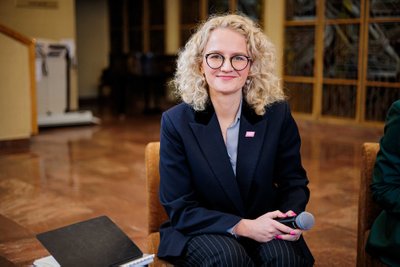Employers' attitudes towards the diaspora are changing dramatically
A large part of those surveyed indicate that their considerations or decision to return are determined not only by homesickness and the desire to build a future in their home country but also by the changing social and economic situation, which involves growing careers, professional development opportunities, and increasing salaries.
Various initiatives encouraging emigrants to build a future in Lithuania are also contributing to the changes. One of them is the Diaspora-Friendly Employer initiative, implemented by the Ministry of Economy and Innovation together with partners, which aims to encourage Lithuanians abroad to choose further career opportunities in Lithuania and employers to hire Lithuanians living abroad or intending to return while they are still abroad.
„The diaspora is an extremely valuable source of talent, significantly contributing to the growth and innovation of Lithuanian businesses. Therefore, we encourage employers to be open, create a favourable work environment, and use the experience and knowledge accumulated by Lithuanians abroad, which will strengthen not only businesses but also our economy,“ said Aušrinė Armonaitė, Minister of Economy and Innovation.

Career opportunities enticed workers to go abroad, but love for Lithuania has encouraged them to return
Agnė Petkutė, who graduated from university in Lithuania and started a successful career in her homeland, left to live abroad 10 years ago – dreaming of realising her personal ambitions and gaining more experience in her professional field.
„I worked for Microsoft all those years, in various positions and countries. After spending five years in Brussels, I decided to go to Barcelona because I wanted to improve my Spanish,“ said Agnė, who has since returned to Lithuania.
A great contract, a good salary, and a wonderful Spanish environment – what more could you want when living abroad? Agnė is open: even if it sounds trite – it was love for her country that prompted her to return.

„Having spent a decade abroad, I realised a simple truth – if you want to achieve something, you have to do your best and be able to work anywhere. But the time came when I no longer saw the point of working for the good of another country and felt the need to give more to my country. I call it a romantic return out of love for Lithuania,“ she added.
Agnė was in no hurry to blindly return to her homeland. While still living abroad, she actively studied the labour market, participated in several job interviews remotely, communicated with acquaintances, and tried to understand whether her professional development and salary expectations were realistic. Realising that everything happens much faster in Lithuania, she decided to leave Spain.
„Lithuania has really changed a lot in ten years, especially the people – they are more open, broader-minded, have fewer fears, and see their own value,“ continued Agnė.
Alongside her own efforts, friends and family helped her to integrate into life in Lithuania more quickly, and state-created initiatives allowed her to find all the most important information for the diaspora in one place (griztu.lt, International House Vilnius). Currently, Agnė is actively looking for work, but, as she says, she focuses on quality and looks for offers that really inspire her to roll up her sleeves.
Returning to Lithuania from the United States with an entire family
Evaldas Ambrazaitis did not go abroad in search of a more comfortable life. While studying at Kaunas University of Technology, the young man took advantage of an exchange programme to spend the summer in the United Kingdom, and after chatting with his classmates, he was tempted to go to the United States of America.
„We went for the summer, and it so happened that a friend persuaded me to stay longer. For a couple of years, I was doing simpler, unskilled jobs, but when I realised that I wanted to continue my education and improve, I went to Omaha to study – I had completed three courses of study in Lithuania, so, having sorted out all the formalities, I obtained a bachelor’s degree in two years and went to Chicago to study for my master’s degree at Loyola University,“ recounted Evaldas.
After graduating, he remained in the USA to work at Loyola University. Although he was doing well, thoughts of returning to Lithuania visited him more and more often. However, the incentive to act on them was constantly lacking. Everything changed quite unexpectedly after talking with friends about his thoughts on returning.

„A few days later, I received a call – an American capital logistics company operating in Lithuania was looking for someone who would be responsible for creating a new accounting department in Kaunas, so after hearing my thoughts about wanting to return home, an acquaintance decided to offer this position to me. It was not ready to give up everything, but my wife and I decided that we had nothing to lose: we would try it, and if we didn’t like it, we would return to the USA,“ Evaldas added.
Evaldas arrived in Lithuania with his family in 2015, and he has no regrets about his decision. However, he does not hide the anxiety he felt: the biggest hesitation was the question of whether he would be able to support his family alone at first, since he and his wife were expecting their second child at the time.
„I left Lithuania in 1999, so the image stuck in my memory was definitely not the most optimistic – getting a job in our country was difficult at the time, and salaries were far from what you could earn in the US. After all, observing only from abroad, you don’t see all the progress and changes that are evident in Lithuania,“ he continued.
Evaldas tried to get a job in Lithuania before the fateful offer to work in a logistics company, but none of the employers he sent his resume to even wrote back. „My good education and work experience were probably overshadowed by the fact of living abroad and the prejudice that compatriots who emigrated have higher expectations,“ Evaldas reflects, and he is now happy to see that the situation in the labour market is changing rapidly.
„I like that the labour market in Lithuania is more focused on family, maintaining a balance between work and personal life, and leisure. In the company where I continue to work, when drawing up the budget, we always discuss the differences: Americans have only one week of vacation, while we have a whole month, and in their eyes, women have such a long maternity leave in Lithuania that colleagues may even forget about them. I would say that the differences are obvious, but to the benefit of Lithuania,“ said Evaldas.

Not everyone is aware of Diaspora-Friendly Employers
Although some employers in our country still have misconceptions about Lithuanians living abroad, the situation has changed significantly in the past few years – multinational companies now operate in Lithuania, Western work culture is also becoming the norm, and salaries are growing the fastest in the entire OECD. A startup ecosystem is successfully existing and growing in Lithuania, and many of them were founded by Lithuanians who returned from abroad and took up these activities after seeing excellent acceleration, incubation measures, and financing opportunities.
The initiative to establish a Diaspora-Friendly Employer badge was born out of the desire to attract talent and help returning Lithuanians overcome difficulties in integrating into the labour market. Its goal is to dispel existing myths, involve Lithuanians abroad in our labour market, and encourage business representatives to welcome returning compatriots. In implementing this initiative, state institutions and non-governmental organisations joined forces, including the Ministry of Economy and Innovation, the Employment Service under the Ministry of Social Security and Labour, and diaspora organisations such as Global Lithuanian Leaders and the Lithuanian World Community.

Companies wishing to receive the Diaspora-Friendly Employer badge must meet at least three of the five following criteria:
Job selections are conducted remotely and/or remote workplaces are established by the company (employers announce remote work opportunities on their websites).
There’s an intercultural and inclusive work atmosphere (the company has an internal document declaring openness to cultures, equal rights, and other progressive provisions).
The ability to communicate in English – internally and externally (the company’s job advertisements are published in Lithuanian and English, and as internal communication in English is convenient for international employees, the company also has key internal documents in English).
The employer has established a clear onboarding process including a clear process for engaging in work activities and/or a mentoring system and providing new employees with an information and/or relocation information package for a smooth start in their new job.
There’s a flexible process for signing employment contracts and agreeing on a start date.
The Diaspora-Friendly Employer initiative is implemented based on the principles of trust and openness and is not bureaucratically regulated and controlled. Employers only need to fill out a special declaration form, which can be found on the Employment Service website, and demonstrate compliance with the specified criteria, and then they will receive a Diaspora-Friendly Employer badge, which is displayed next to the job advertisements published by the employer and/or can be used as a communication and marketing tool to attract employees.
